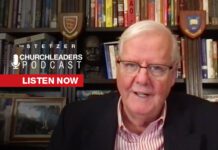“One of the ways we test if this is a healthy or unhealthy pushing through our limits is, is this bringing about shalom or is it undermining it? How is this affecting relationships? How is this affecting our relationship with God, neighbor, earth?”
“Stress actually can be a positive thing…you need some stress on bones for them to get strong. The problem is we’ve taken a good gift and we’ve made it a terrible master. And where stress is meant to be episodic, we’ve made it a lifestyle.”
RELATED: Carey Nieuwhof: Why Burnout Is Not Inevitable and How Pastors Can Avoid It
“I think part of what the church needs to do in our day as an apologetic witness is to help people reimagine what a humane life looks like.”
“The God who loved what he made doesn’t hate it now. He loves it enough to remake it and he loves it and he affirms it by entering into it. And the infinite God enters into finitude in and through the incarnate Christ.”
“Jesus told the disciples after a full day, ‘Listen, we need to get away and pray.’ And then all of a sudden they get out of the boat and they get to the other side and there’s a crowd. And he wanted to retreat, and instead they have to push themselves…and at times in ministry, you still need to do that. You need to go beyond what you think your limit is. But when you keep reading, then Jesus goes away still because he still needs the quiet, he still needs the alone, he still needs the restoration.”
“We are compassionate to our congregation. And we say, ‘God really loves you. He really accepts you. You’re not your work.’ But no matter what our words say, if we are modeling to them that we never stop, we never say no, then how can they really believe the benediction we’re pronouncing over them?”
“Are we making worship another task? Is it another thing that we want to be efficient?…And part of what’s amazing is worship, like love, is inefficient, and I think that’s super hard for us.”
“You ask most Christians, including most leaders, do you pray like you think you should? And the answer is almost always no. But if we explore why, it’s often…because it feels like a waste of time.”
“If you’re the pastor, you need to start cultivating in the church a different sanctified imagination.”
“I think discipleship in our day that’s so countercultural is to present a humane existence in an increasingly inhumane world.”
“And our problem is we feel like if it’s valuable and important, then I must do it. And that’s where our individualism is hurting us. If we affirm the community, then it’s wonderful that there are things are happening, even stuff we don’t know about. The problem is, if there’s no one in our communities doing these things, then we’ve got big issues.”











